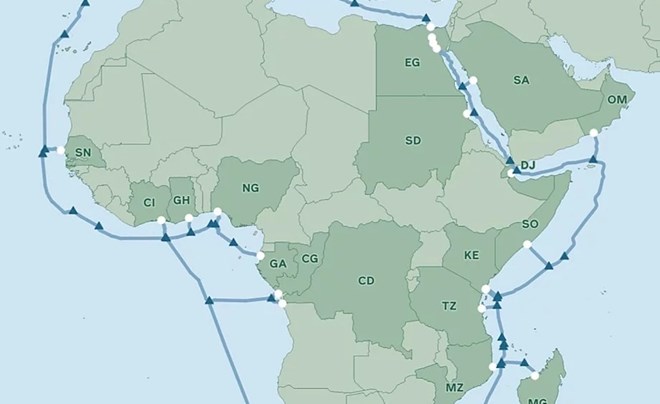
Sunday May 31, 2020

2Africa will connect 16 countries in Africa with the Middle East and Europe.
London — In July last year Google initiated the Equiano cable. The announcement of the 2Africa cable which involves Facebook completes the second generation cable build announcements. Russell Southwood talked to Ibrahima Ba, Network Investments Lead at Facebook about how it might work.
This massive new cable will be 37,000 kms long, connecting 23 countries. The 16 African countries connected are Congo-Brazzaville, Cote d'Ivoire, Djibouti, DRC, Egypt, Gabon, Ghana, Kenya, Madagascar, Mozambique, Nigeria, Sudan, Senegal, Somalia (landing at Mogadishu), Tanzania and South Africa.
It will provide a nominal capacity of 180 Tbit/s, a capacity that is "significantly higher" than the capacity of all existing cables and has the ability to keep adding a great deal more capacity as and when needed. The hovering question is whether African markets will have the capacity to absorb this level of additional international capacity. According to Ba:"It's rather like an insurance policy. The existing cables do not have enough capacity to fulfill demand in the next 3-5 years.The 2Africa cable will integrate the new SDM1 technology, designed by ASN, allowing the deployment of a maximum of 16 pairs of fibers. It will also incorporate "optical switching" technology to allow flexible management of bandwidth. The consortium has commissioned ASM and Alcatel Lucent to build the cable and according to Ba, it should be completed by late 2023 and early 2024.
It has eight international and African partners, at least one of which had spent several years trying to initiate its own consortium. The consortium members are: China Mobile International, Facebook, MTN GlobalConnect, Orange, stc, Telecom Egypt, Vodafone and WIOCC (the east coast cable consortium).
The management and ownership structure of the cable is the classic consortium model, not unlike SAT3 and WACS. However, the parties will not talk about the level of investment that each have made in the cable or indeed who has the largest stakes in it. When I asked Ba whether Facebook had a majority, he gave me the "I can't comment on that" response.
However, the consortium members are publicly committed to some form of Open Access principle:"There are no restrictions on buying and selling capacity. Landing parties will provide capacity through open landing stations or data centres at a pre-determined cost. For example, all of the parties landing in Nigeria will make capacity available." In this context, an agreement to provide a completely new link has been signed between 2Africa, Airtel and Telecom Egypt. This link will link the Red Sea and the Mediterranean, the first in more than a decade.
Access will either be through carrier-neutral data centres (some countries do not yet have one or more of these) or through an Open Access landing station:"These will be selected by parties in the cable." Without knowing the shareholdings in the consortium, it's not possible to see who is likely to the most influence in decision-making. Thus far under 10 of the 16 countries to be connected have carrier-neutral data centres and some of the parties have interests in data centres that are described as carrier-neutral
So will all this new capacity lead to lower prices once it's built? Yes, it probably will but as usual no-one is willing to say that:"There are two components to answering your question. It depends on each of the consortium members; the OTT, the MNOs and wholesale companies. The pricing of retail capacity depends on many other factors. So I don't know if it will translate directly into lower prices." So will it fall much below the existing under US$5 per meg at high volumes:"That's a hard question. I don't known. Wholesale pricing is coming down substantially."
From Facebook's point of view, it's a different kind of player in the system:"It needs to supply to POP locations to enable growth. Facebook is not a licensed wholesale provider in our locations."
Copyright Balancing Act. Distributed by AllAfrica Global Media (allAfrica.com).